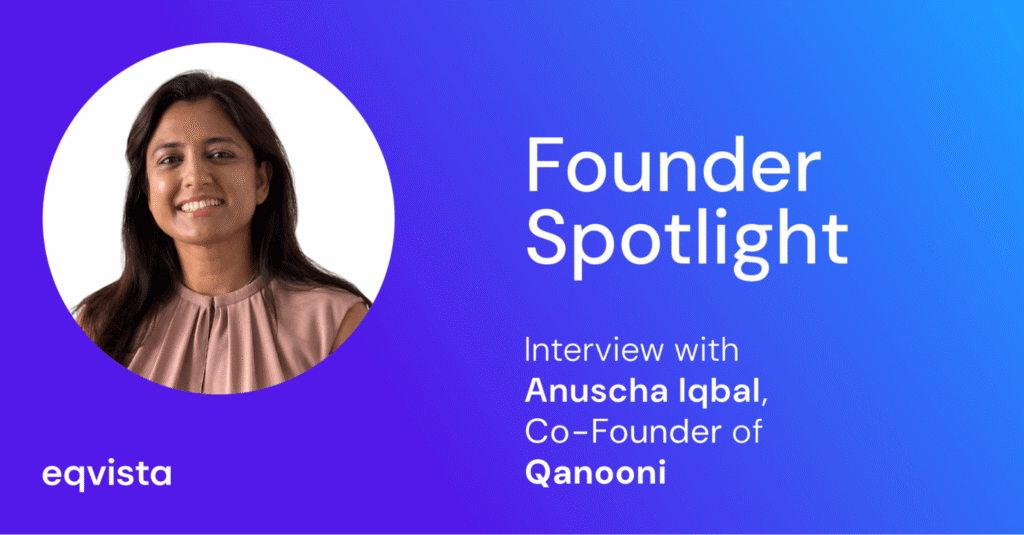From Fintech to Legal Tech: How Qanooni is Shaping Legal AI in the Middle East
Sometimes the most transformative ideas begin with a simple question: what if legal work could be as intuitive and data-driven as fintech? For Anuscha and Ziyaad, the leap from scaling a successful payments startup to founding Qanooni wasn’t just about technology—it was about reimagining what trust, automation, and client-centric innovation could mean for law firms in the Middle East.
Eqvista welcomes a candid conversation with Anuscha and Ziyaad, visionary co-founders of Qanooni. Having charted a path from fintech success to pioneering legal AI, their journey blends deep regional expertise, operational know-how, and a commitment to shaping tomorrow’s legal practices. Through Qanooni, they address real-world pain points—bringing context-aware AI to the heart of legal work and redefining what trust, automation, and user-centric technology can mean for law firms.
This interview explores their unique perspective on innovation for the Middle East, the responsibilities of building intelligent legal solutions, and their actionable advice for firms ready to embrace digital transformation.

Anuscha, thank you for joining us. What inspired you to transition from a successful career in investment banking and fintech to founding Qanooni, a legal AI platform?
Thank you for having me! Actually this is the second start up Ziyaad and I are building together. We had previously created Spotii, a buy now pay later business which we scaled across UAE, KSA and Bahrain and eventually sold to a publicly listed company based in Australia. After that we knew we wanted to build an AI first company and when we partnered with Karim who is a lawyer we knew it was going to be in the legal space.
With over 18 years in finance and fintech, how have those experiences influenced Qanooni’s product vision and market strategy?
When I was in finance I was investing in companies and I’ve seen firsthand how technology can transform industries. That experience has shaped Qanooni’s product vision in a very intentional way. We’re not just building software; we’re solving for the deep operational and trust-based challenges that legal professionals face daily.
From our fintech experience we took our learnings to bring a strong focus on automation, data integrity, and user-centric design — all essential in fintech, and equally critical in legaltech. Strategically, we’ve positioned Qanooni to mirror what worked for us: start with real workflow pain points, build trust through transparency and compliance, and scale with partners who understand that digital transformation in legal is not just inevitable, but overdue.
Given your extensive regional expertise, how do you see the Middle East legal market evolving with AI adoption, and how is Qanooni positioned to lead that change?
The Middle East, UAE in particular is leading AI adoption. Within Legal there’s growing momentum toward digital transformation, driven by government-led innovation agendas and increasing client demand for faster, more transparent services. But AI adoption here has to align with local regulatory frameworks, bilingual workflows, and relationship-driven practices.
Our deep regional understanding is exactly what positions Qanooni to lead this shift. We’re not retrofitting a global tool for the Middle East, we are building a platform that’s natively aware of its legal culture, languages, and sensitivities. From AI-assisted document review to litigation tracking, everything we design is grounded in real use cases from local firms.
We see AI not as a replacement for lawyers, but as an enabler, freeing up time from admin-heavy processes so legal professionals can focus on strategy and client value. That’s the future we are helping shape, and we believe Qanooni will be at the heart of it.
How does Qanooni’s AI approach differ from other legal technology platforms currently in the market?
What sets Qanooni’s AI approach apart is our focus on contextual intelligence. We don’t just apply generic large language models to legal tasks; we tailor AI to the real legal environments our clients operate in.
Most platforms are overly generic, lacking the nuance needed. Qanooni is different. Our AI is trained on regional legal language, workflows, and document structures, making it far more accurate and usable in practice. This is further amplified by our hybrid approach: combining automation with human oversight, what we call our lawyer in the loop program.
Our goal isn’t to replace lawyers, but to give them intelligent tools that amplify their judgment. For example, our AI doesn’t just extract clauses, it understands obligations, flags risks, and learns from how your firm interprets certain terms over time. Allowing us to provide a tool that keeps each firm’s tone, style and standards which is what makes those firms unique.

What is your strategy for staying ahead of rapid technological changes, especially in generative AI?
This is such a fast moving space!
Staying ahead in generative AI means balancing two things: speed and purpose. At Qanooni, we are not chasing trends, we are tracking them closely, testing fast, and implementing only what creates real value for legal teams.
Our strategy is threefold:
- Build on flexible infrastructure – We’ve architected Qanooni to be model-agnostic, so we can rapidly integrate advancements in LLMs without overhauling the platform.
- Invest in in-house R&D – We don’t just rely on third-party models; we train domain-specific components in-house, tuned to local legal workflows, data privacy expectations, and language needs.
- Co-develop with users – We stay close to the ground by working directly with law firms and legal departments. Their feedback drives our roadmap, ensuring we are solving today’s problems while keeping an eye on tomorrow.
Generative AI is evolving fast, but legal tech requires trust, accuracy, and context. That’s where we stay focused. We’ll move fast, but never break what matters.
Scaling a legal tech startup involves complex challenges, especially concerning data security and adoption. How does Qanooni address these issues?
You’re absolutely right! In legal tech, scaling isn’t just about product features; it’s about trust. At Qanooni, we’ve treated data security and user adoption as non-negotiables from day one.
On security, we built the platform with enterprise-grade infrastructure. Data is encrypted at rest and in transit, hosted in-region to meet local compliance requirements, and we adhere to strict access controls and audit trails. We are ISO27001 certified and are in the process of obtaining our SOC 2 certification. And most importantly, no customer data is used to train our models.
On adoption, we recognize that legal teams aren’t just looking for innovation they need confidence and continuity. That’s why we focus on seamless onboarding, intuitive design, and AI that supports, not disrupts, existing workflows. We deliberately built our solution within Microsoft Word and Outlook because that is where lawyers spend most of their time.
Scaling in legal tech is about building credibility every step of the way. We’re not just offering tools, we are earning trust through every interaction.
Congratulations on raising $2 million in pre-seed funding. How do you see this pre-seed round positioning Qanooni for a potential Series A?
Thank you! We are very grateful to our investors for having the confidence in us, we are now focused on executing with discipline.
This round is about focus: proving product-market fit at scale, strengthening our core AI capabilities, and expanding our footprint across the UAE and UK. We will continue to refine the user experience, and make sure our AI delivers real operational value.
Everything we’re doing now is designed to lay the groundwork for the next round. By the time we get there, we want clear traction metrics, deep client engagement, and a defensible moat in a region that’s just beginning to open up to legaltech.
What is your long-term vision for Qanooni, and how do you foresee the company evolving with future advancements in AI?
Our long-term vision for Qanooni is to become the backbone of legal operations across the globe. A platform that not only reflects how firms work today but actively shapes how they evolve tomorrow. As AI continues to advance, we are committed to staying at the frontier of what’s possible: from predictive legal insights to truly adaptive workflows tailored to each firm’s unique way of working.
We don’t see Qanooni as just legal tech, we see it as infrastructure for modern legal practice. Over time, that means deeper integrations, more proactive decision support, and ultimately, empowering legal teams to move from reactive to strategic, without compromising compliance or control.
What advice would you give to traditional law firms looking to modernize and adopt AI-powered tools for the first time?
The tools are here and it’s essential to adopt them or be left behind. Imagine the investment bank that would have insisted their analysts use the calculator when Excel had been released.
The biggest mistake firms make is waiting for the “perfect” moment or solution. The truth is, transformation isn’t a one-off project, it’s a mindset shift. Begin by identifying pain points where AI can deliver quick, visible wins such as automating repetitive tasks, accelerating document review, or improving internal knowledge access. Understand what the limitations are of the tool.
But don’t just adopt tools, invest in understanding how they work and how your team can adapt. AI is not a silver bullet for everything and if that is the expectation then adoption will fail. Empower your lawyers to be part of the change, not subject to it. And partner with platforms that understand the legal industry deeply, not just the tech.
Modernizing isn’t about replacing people; it’s about freeing them to focus on the work that truly matters. Give them the right tools to do so.
